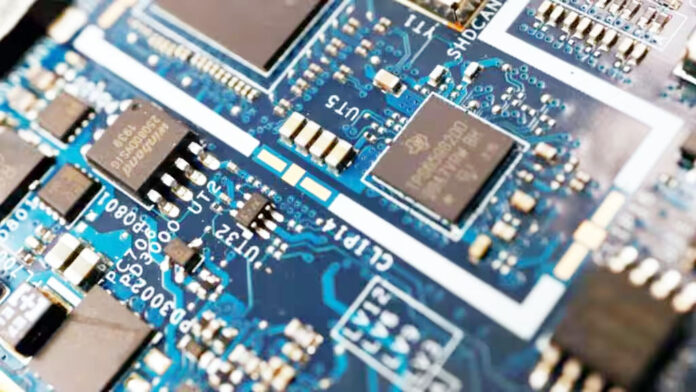NEW DELHI, June 27
Encouraged by the government’s incentive schemes, manufacturers of electronics and semiconductors are set to commit close to Rs 3 trillion as capital expenditure over the next five years. Companies, big and small, are setting up shop to make everything from smartphones and laptops to wearables. They are eyeing a huge market for electronics, estimated by the Confederation of Indian Industry, at $500 billion by 2030.
As Ashok Chandak, president, India Electronics and Semiconductor Association (IESA), points out, “it is domestic demand and export potential that is driving the investment in the sector”.
Indeed, India is looking to become a part of the global electronics value chain emulating other nations. Vietnam, for instance, caters to its domestic mobile phones and electronics market valued at $2 billion, but the bigger pickings are in the export opportunity pegged at $40 billion. India’s companies have a $33-billion market locally while the export opportunity is nudging $30 billion.
Randhir Thakur, managing director & CEO, Tata Electronics, says the vision is to become the world leader in electronics manufacturing by offering integrated solutions across the value chain to customers seeking a resilient supply chain.
The production-linked incentive scheme apart, SPECS or scheme for promotion of manufacturing of electronic components and semiconductors has also enthused companies to set up production capacity.
The Rs 76,000-crore incentive package for semiconductors has already seen four projects backed by Micron, the Tata Group and CG Power, and worth Rs 1.5 trillion getting the go-ahead. The combined investments by these promoters could be around Rs 50,000 crore, given that the government will provide support to the extent of 50% of the cost and respective state governments too will chip in. The four units with a combined capacity of 80 million chips per day will have a presence across the value chain – design, packaging and fabrication.
Meanwhile, iPhone maker Foxconn has committed to an investment of $1.5 billion or about Rs 12,500 crore for its operations in the country. Vedanta Group chairman Anil Agarwal recently talked about plans to invest $20 billion or Rs 1.6 trillion in the next four years to produce, electronics, semiconductors and glass.
Smaller contract manufacturers like Dixon Technologies, which makes a range of products from smartphones to television sets, are planning for a capex of about Rs 1,800 crore in the next three years. CFO Saurabh Gupta told analysts recently the company has a joint venture with Ericsson for inverter controller boards for which it would be incurring some spends. This would take the overall capex of the company for FY25 to about Rs 570 crore.
The Rs 17,000-crore PLI scheme for IT hardware has attracted several producers. Between them, 27 companies, including Acer, Asus, Dell, HP and Lenovo, have committed to investments of about Rs 3,000 crore. They will manufacture devices such as laptops, tablets, all-in-one PCs and servers.
Kaynes has lined up close to Rs 4,000 crore for its semiconductor assembly projects. The company has started building the factory in Telangana ahead of the government’s nod. Again, AMD and Applied Materials have announced investments of Rs 3,300 crore each to finance R&D as also to develop and commercialise technologies for semiconductor manufacturing equipment.
According to Saurabh Agarwal, tax partner at EY India, sustaining the incentives is crucial to position India as a global manufacturing hub.
“While these schemes have been a game-changer for investments in electronics, sustained momentum requires continued support,” Agarwal observed.
According to Ajai Chowdhry, co-founder, HCL, founder & chairman of EPIC Foundation, follow-on schemes in semiconductors and components and PLI schemes for IT hardware will be key for the continuity in private capex.
Sudhir Goyal, CFO at Amber Enterprises, which makes consumer durable products, has indicated the company is looking to incur a capex of Rs 350-375 crore in FY25. The company plans to make PCBs (printed circuit boards) and is awaiting the incentive scheme for components. “With an anti-dumping duty being levied on PCBs, we see an opportunity. We expect more marquee customers in auto and IT-related products categories and consumer durables,” Goyal said.
Gorilla glass maker Corning and Optiemus Infracom have teamed up for a new cover-glass finishing facility in Tamil Nadu. The joint venture is expected to invest close to Rs 1,000 crore in the facility. The unit, according to Ashok Gupta, executive chairman at Optiemus Infracom, would be the country’s first cover-glass finishing operation for mobile consumer electronics.



























